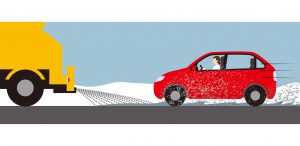
Many of us drive in the snow and ice every winter. To help keep roads safer, road crews will usually spread things like rock salt on the road to help provide drivers with better traction. Although rock salt is great for making the roads safer during the winter months, it can also cause damage to your vehicle.
Rock salt, also known as road salt, contains sodium chloride that works to lower the freezing point of water. Water normally freezes at 3 degrees Fahrenheit, but when ice and snow are exposed to rock salt, they need colder temperatures to stay frozen, making it difficult for ice to form.
Road salt keeps the roads safer, but it can wreak havoc on your vehicle. When rock salt comes into contact with metal, it can cause a chemical reaction with any exposed metal, resulting in corrosion. If this corrosion continues, it can lead to rust forming, which can lower the resale value of your vehicle. The areas of your car most affected by rock salt include:
The undercarriage of your car experiences most of the rock salt damage. It is important to keep in mind that once the corrosion caused by rock salt begins to eat away at your brake lines or axle, you are at a higher risk of an accident, making it vital for you to check underneath your car for any corrosion during the winter season.
If your car has experience rust or damage from the road salt this winter, be sure to visit Freedom Collision Center to have the damage repair. Our highly-skilled and experienced technicians use industry-leading equipment and parts to provide you with the best in body repair services.
Contact us today to learn more!